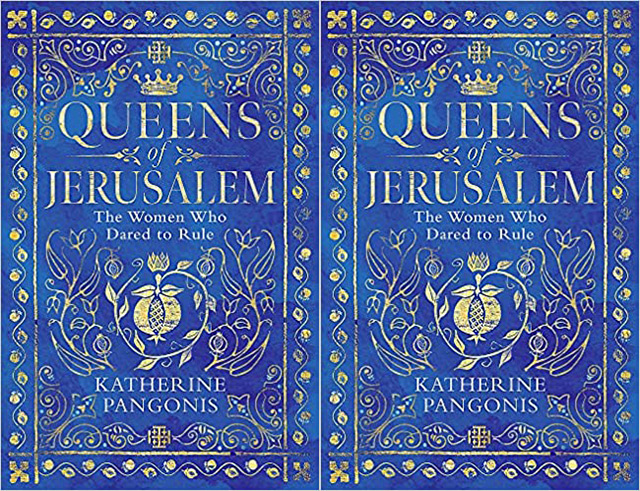Queens of Jerusalem: The Women Who Dared to Rule
Book review

Queens of Jerusalem: The Women Who Dared to Rule, Katherine Pangonis, Weidenfeld and Nicolson, 2021, 250p, £20-00. ISBN 978-1-4746-1407-8.
For many historians Outremer was the destination of the Crusades and our focus has been on what happened to the crusaders, both on their journeys and in their struggles at that location at the far end of the Mediterranean. Amongst the many attractions of this book by Katherine Pangolis is that she has made Outremer the focus, in effect making that destination the central feature of the book.
The reason why it is named ‘Outremer’ without the definite article is readily revealed: as with many linguistic developments, ‘Outremer’ has emerged from its medieval French description and meaning as ‘overseas’ or ‘lands beyond the sea’.
With the provision of very helpful maps, family trees and an extensive chronology the background and development of Outremer is carefully revealed. The location of the principal state of the Kingdom of Jerusalem is clearly delineated, along with Principality of Antioch and the Counties of Edessa and Tripoli. Understanding this governmental structure provides a good background to her narrative.
Katherine’s special purpose is to reveal the remarkable role that various women played in the leadership of these four regions. It is part of a very positive trend to try unravel what was happening to women in historic times, with documentary and literary sources reluctant to mention them. In this particular instance it is the involvement of a series of high-status women who found themselves at the heart of government in Outremer. Of these the most significant is Queen Melisende of Jerusalem. This because she was ‘queen regnant’ as opposed to merely being ‘queen consort’, in other words she inherited her throne from her father, Baldwin II. This gave her a constitutional status, even when she shared leadership with her husband, Fulk, and her son, Baldwin III.
In exploring the role and actions of Queen Melisende, parallels with Helen Castor’s ‘She-Wolves’ emerge. The latter were four talented women who demonstrably exercised power through sheer personality, pointing the later Tudor conundrum where, following the death of Edward VI, basically only women could succeed. Katherine Pangolis has demonstrated that this constitutional scenario had already been experienced more than once in Outremer. She has utilised and interpreted all the sources available, principally the writing of William of Tyre, to give us a strong perspective on how Queen Melisende and others exercised their leadership.
For about a century these ‘settler’ states existed alongside a continuous threat from their Moslem neighbours, with eventually the area being over-run by Saladin. The narrative of how these states managed to survive and then eventually over-run is well-explained in this work. What is offered, however, goes beyond the local narrative because we are also introduced to the inter-relationship of these emergent dynasties with the Byzantine Court and various significant families in France and Italy, along with the religious divergences between the Roman Catholic and Orthodox Christian traditions.
Queens of Jerusalem provides a good opportunity, in a very succinct form, to gain a strong understanding of what was a sustained focus of West European diplomatic and religious policy for over a century but it also offers a unique perspective on women’s history.

